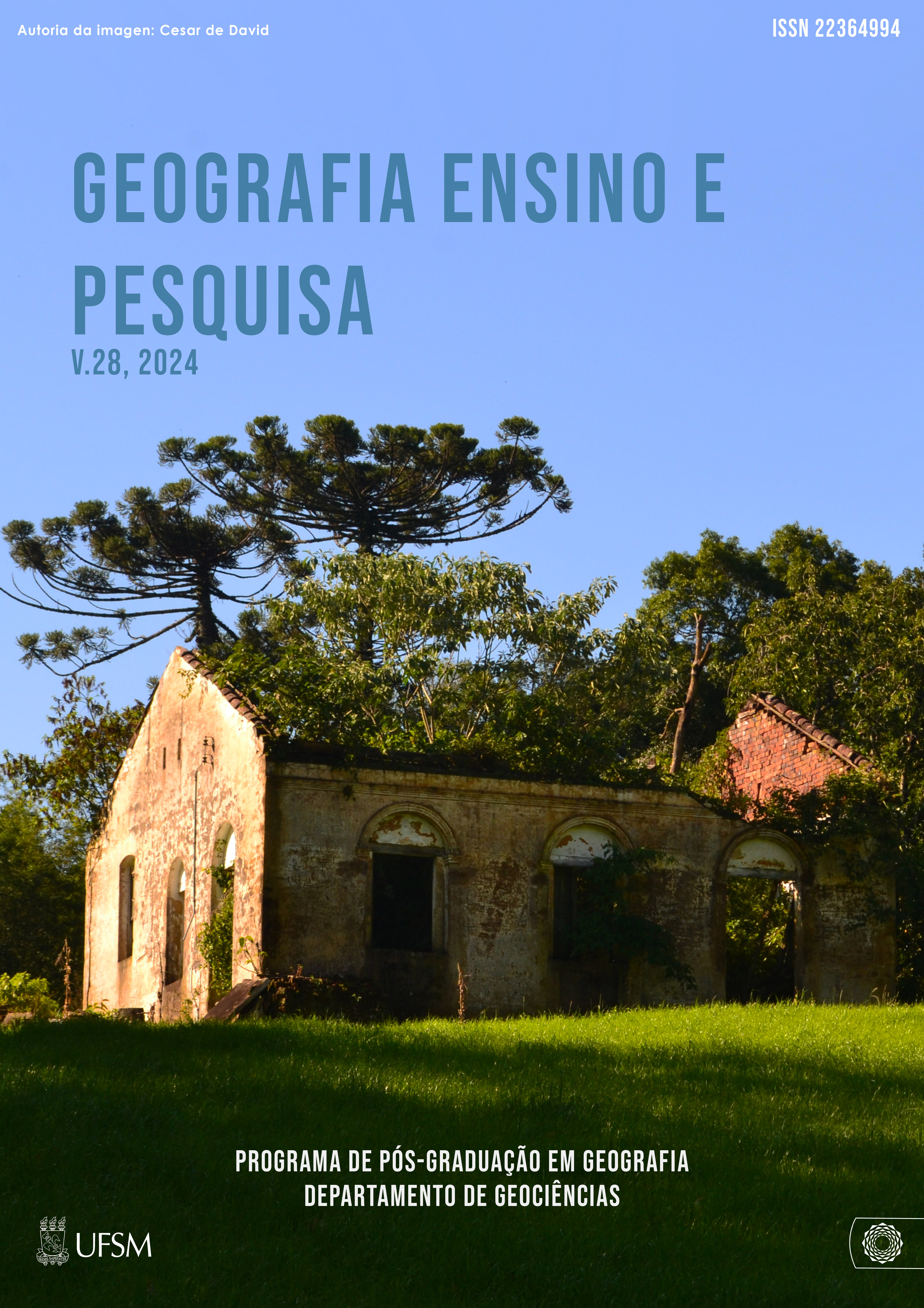Ecological transition in French agriculture: the role of thinking, dense and diversified networks
DOI:
https://doi.org/10.5902/2236499474278Keywords:
Conservation agriculture, Sustainable agriculture, Organic farmingAbstract
This article aims to analyze the voluntaristic initiatives implemented by French farmers’ collectives aiming at the environmental, economic, and social sustainability of their agricultural production systems in the context of facing the socioeconomic and environmental implications of the modernization process implemented in the technical base of agriculture. This study was conducted through the collection and analysis of data and information from secondary sources, participation in events organized by three farmer networks, and application of forms with qualitative and quantitative questions with the members of these networks. From a geographical analysis perspective, it appears that the collective dynamics engendered by the networks studied contributed to the process of reappropriation of space by farmers and their organizations, the strengthening of the social, economic, and political dynamism of the territories, and the institution of spaces of contiguity, solidarity, reciprocity, horizontality, autonomy, and hope regarding the countryside.
Downloads
References
BOINON, J-P. Les politiques foncières agricoles en France depuis 1945. Economie et statistique, [S.l.], n. 444-445, p. 19-37, 2011. DOI: https://doi.org/10.3406/estat.2011.9641
BOSSARD, C. ; SANTIN, G. ; GUSEVA CANU, I. Surveillance de la mortalité par suicide des agriculteurs exploitants: Premiers résultats. Saint-Maurice: Institut de veille sanitaire, 2013. Disponible à partir de l'URL: http://www.invs.sante.fr
BUANEC, B. le. Le tout bio est-il possible ? 90 clés pour comprendre l’agriculture biologique. Versailles: Éditions Quæ, 2012.
DARRÉ, J-P. Les hommes sont des réseaux pensants. Sociétés contemporaines, n. 5, p. 55-66, 1991. DOI: https://doi.org/10.3406/socco.1991.986
DARRÉ, J-P. La recherche coactive de solutions entre agents de développement et agriculteurs. Paris: GRET, 2006.
DARRÉ, J-P. ; LE GUEN, R. ; LEMERY, B. Changement technique et structure professionnelle locale en agriculture. Économie rurale, n. 192-193, p. 115-122, 1989. DOI: https://doi.org/10.3406/ecoru.1989.4004
DELEAGE, E. Paysans de la parcelle à la planète: socio-anthropologie du Réseau Agriculture Durable. Paris: Ed. Syllepse, 2004.
DESRIERS, M. L ‘agriculture française depuis cinquante ans: des petites exploitations familiales aux droits à paiement unique. L’agriculture, nouveaux défis, Paris, p. 17-30, 2007.
DUFUMIER, M. Famines au sud, malbouffe au nord: comment le bio peut nous sauver. Paris: Nil Editions, 2012.
FOOD AND AGRICULTURE ORGANIZATION OF THE UNITED NATIONS (FAO). Agriculture and Consumer Protection Department (AG). Conservation Agriculture, 2015.
GIRARD, L. Vous dépensez 100 euros dans l’alimentaire, combien vont aux agriculteurs? Paris: Le Monde, 2016. Disponível em: <https://www.lemonde.fr/economie/article/2016/02/08/vous-depensez-100-euros-dans-l-alimentaire-combien-vont-aux-agriculteurs_4861337_3234.html>. Acesso em 01 set. 2020.
JAS, N. Pesticides et santé des travailleurs agricoles en France: questions anciennes, nouveaux enjeux. Le courrier de l’environnement de l’INRA, v. 59, p. 47-59, 2010.
JOLLIVET, M. La grande transformation de l’agriculture française sous l’oeil du sociologue. Économie rurale, n. 300, p. 26-29, 2007. DOI: https://doi.org/10.4000/economierurale.2098
LAURENT, F. Les pollutions des ressources en eau par l’agriculture dans l’ouest de la France. In: Marchand, V. L’eau, source de vie, source de conflits. Rennes: Editions Milan, 2006. p. 143-150.
LAURENT, F. L’agriculture de conservation et le non-travail du sol: répartition spatiale dans les Pays de la Loire. Cahiers nantais, p. 5-16, 2014.
LAURENT, F. L ’Agriculture de Conservation et sa diffusion en France et dans le monde. Cybergeo, document 747, pp. 1-22, 2015. DOI: https://doi.org/10.4000/cybergeo.27284
LAURENT, F.; MEDEIROS, R. V. Des réseaux d’agriculteurs en faveur de l’environnement en France. Cybergeo, p. 1-25, 2010. DOI: https://doi.org/10.4000/cybergeo.23152
ROY, P. « 30 % des agriculteurs gagnent moins de 350 euros par mois » : scandale ou pas? Paris: Le Monde, 2017. Disponível em: <https://www.lemonde.fr/idees/article/2017/10/30/30-des-agriculteurs-gagnent-moins-de-350-euros-par-mois-scandale-ou-pas_5207780_3232.html>. Acesso em 01 set. 2020
MAZOYER, M. ; ROUDART, L. Histoire des agricultures du monde: du néolithique à la crise contemporaine. Paris: Seuil, 1998.
MONROZIER, A. J. Le suicide des agriculteurs en chiffres. França: France Bleu Vaucluse, 2018 Disponível em: <https://www.francebleu.fr/infos/societe/le-suicide-des-agriculteurs-en-chiffres-1517491824>. Acesso em: 01 set. 2020
MÜLLER, P. Le technocrate et le paysan: essai sur la politique française de modernisation de l’agriculture de 1945 à nos jours. Paris: Éditions ouvrières, 1984.
OLIVIER, G.; BELLON, S. Dynamiques paradigmatiques des agricultures écologisées dans les communautés scientifiques internationales. Natures Sciences Sociétés, v. 21, p. 166-181. 2013/2. DOI: https://doi.org/10.1051/nss/2013093
PECH, M. Vingt cinq ans de politiques agroenvironnementales: vers une territorialisation de la politique agricole. 2016. 394 f. Thèse (Doctorat en Géographie) – Université du Maine, Le Mans, France, 2016.
POCHON, A. Les Champs du possible: plaidoyer pour une agriculture durable. Paris: Syros, 1999.
PRETTY, J. Agricultural sustainability: concepts, principles and evidence. Philosophical Transactions of the Royal Society B: Biological Sciences, n. 363, p. 447-465, 2008. DOI: https://doi.org/10.1098/rstb.2007.2163
Downloads
Published
How to Cite
Issue
Section
License
Copyright (c) 2024 Geografia Ensino & Pesquisa

This work is licensed under a Creative Commons Attribution-NonCommercial-ShareAlike 4.0 International License.
The journal Geografia – Ensino & Pesquisa will obtain the auctorial rights for all published texts. This also implies that the text can be published anywhere in the world, including all rights on renewal, expansion and dissemination of the contribution, as well as other subsidiary rights. The author’s get permission to publish the contribution in other medias, printed or digital, may be in Portuguese or translation, since the publication is credited to Revista Geografia – Ensino & Pesquisa.The journal Geografia – Ensino & Pesquisa will obtain the auctorial rights for all published texts. This also implies that the text can be published anywhere in the world, including all rights on renewal, expansion and dissemination of the contribution, as well as other subsidiary rights. The author’s get permission to publish the contribution in other medias, printed or digital, may be in Portuguese or translation, since the publication is credited to Revista Geografia – Ensino & Pesquisa.







